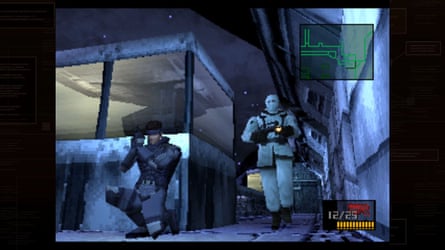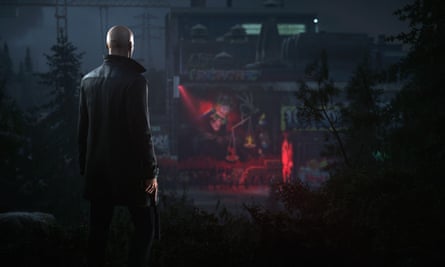I’ve worked as a guard and bouncer for nearly 20 years, first putting on the black uniform not long after 1998’s Tenchu: Stealth Assassins snuck on to the original PlayStation. Like that game, my job can involve hours of watching stuff and moving alone through darkened spaces, interspersed with moments of frantically trying not to get killed (thankfully, not by a Sengoku-era arrow – though I did once have a bloke throw a temporary bus stop sign through the window of a building I was guarding).
I’ve always been intrigued by how the intruders I chase off in my job compare to the infiltrators we love to play in stealth games, all of whom seem able to slip past guards without a hitch. If they’re discovered and a scuffle breaks out, those guards will fight to the death. That puts my own tenacity to shame, especially if they’re on the same £12.03 an hour that I get. Maybe they studied a different emergency procedures module to the one I remember, which reminds you that a living witness is more useful than a dead hero.
Games have to be playable, of course, but the gap between real security and stealth games is too big to ignore. Especially when it comes to combat and pickpocketing: despite having to sometimes get physical in the job, even rolling around on the deck with people who have gone beyond verbal reasoning, I’ve never had someone snatch the master keys off my belt as easily as protagonist Emily Kaldwin can do in Dishonored 2.
I’ve also never caught anyone sneaking a fibre-optic camera under a door, Sam Fisher-style. It would probably be a lot easier to do now that you can buy snake inspection cameras for £20, but the nearest I’ve got to illicit entryway surveillance was a guy loitering on the pavement outside a block we were protecting, hunched over, checking ground-floor windows for gaps in the curtains. (By the time we got to him, someone leaving the pub over the road had chinned him unconscious).
Another guard myth I have to shatter is that our clothes don’t come apart as easily as they do in the strip dance finale of The Full Monty. (That also might explain why I’ve never had my uniform stolen after being tranquilised: something that Agent 47 of IO’s Hitman franchise can do with the touch of a button.) Although those games are some of my favourite in the stealth genre – who doesn’t love disguising themselves in medieval armour while sneaking around a cocktail party? – one thing about the series that bugs me is how easily our hero can move an unresponsive body.
By grabbing just a single limb, Agent 47 is able to pull his targets up the stairs, or dump them in a chest as easily as if he were taking the bins out. I definitely didn’t feel that sleek when I was helping my shift-mate deadlift an unconscious spice user out of a car park.

Sometimes, I wish a game would come along where it’s the hired heavy who’s the hero, and they’re allowed to choose how they confront intruders. The recently-remastered Metal Gear Solid series comes close, as does this year’s RoboCop: Rogue City in places: despite feeling like a rail shooter, the game features moments of sneaking, and you’re rewarded for thinking tactically and defusing confrontations. But you still rely heavily on your Auto-9 pistol to resolve most encounters.
As someone who’s armed with only a torch and a first aid kit, I have to approach fights more carefully than a bandana-wearing mercenary or a bombproof cyborg. A game based on my job might feel like those no-gear levels where you get captured and lose all your kit. Those instances are when stealth games cross over into security realism. Unless you’re doing door duty at an axe-throwing bar, the chances are you’re evenly matched against a single attacker. I enjoyed seeing that gameplay mechanic in 2017’s Echo, where you have to outfox a reflected version of yourself.
A few times in the job I’ve wished the action was more like an open-world game, and it was possible to fast-travel across the map when overwhelmed. I know wasting guards is pretty commonplace in Grand Theft Auto, but I’m still envious of the series’ approach to police response. Guards’ duties mean we can be first on scene to overdoses, stabbings, suicides and car crime. It would be nice to think that I could instantly get a star’s worth of police support if someone punched in a windscreen.
after newsletter promotion

Oddly enough, it’s an early Rockstar title – murder sim Manhunt – that feels the most realistic to me when it comes to spending long hours trying to protect people and buildings. In that game, you play as a prisoner plucked from Death Row and forced to creep around junkyards, killing people for reality TV ratings. Doesn’t sound very guard-like, I know. But watching the killer go along with the camera crew reminds me of how people’s behaviour changes once they realise they’re being recorded – in my case, by the body-worn camera on my protective vest. I’m sure it’s saved my bacon more than once.
It does serve as a reminder that everything I do in my job can be potentially played back to a jury. So, unlike the most ruthless stealth character I’ve ever encountered – the feathered psychopath at the centre of Untitled Goose Game – I always try to play nice.

